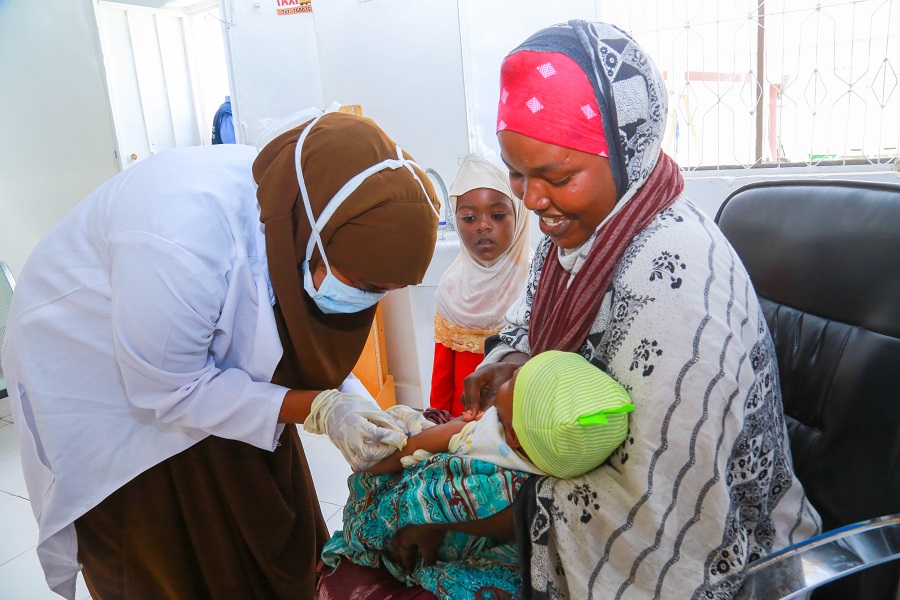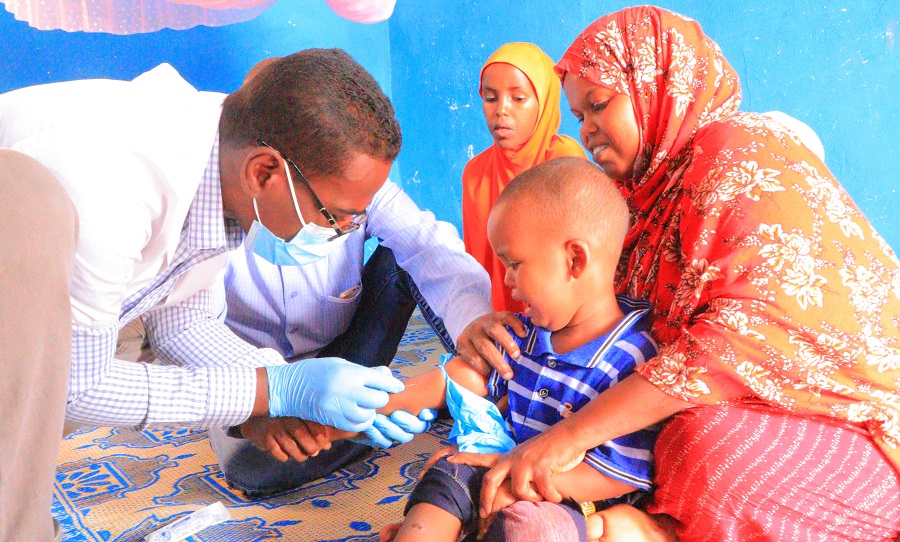 WHO supported the federal and state governments to resume routine childhood vaccinations during the COVID-19 outbreak in Somalia. Credit: WHO/Somalia
WHO supported the federal and state governments to resume routine childhood vaccinations during the COVID-19 outbreak in Somalia. Credit: WHO/Somalia
23 April 2022, Mogadishu – While marking World Immunization Week this year, Somalia’s Federal Ministry of Health and Human Services, the World Health Organization (WHO) and the United Nations Children’s Fund (UNICEF) jointly urged humanitarian partners, local private agencies and donors to help boost immunization efforts and outreach across Somalia. This message is in line with the theme for World Immunization Week, 2022, running from 24 to 30 April, which is ‘Long life for all – in pursuit of a long life well lived.’
World Immunization Week 2022 aims to spur greater engagement around immunization globally, to reiterate the importance of vaccination and improve the health and well-being of everyone, everywhere.
In line with this global call and taking into account only 9% of Somalis have been fully vaccinated against COVID-19, Dr Fawziya Abikar Nur, Minister of Health, the Federal Government of Somalia said, “In 2020, the world witnessed a pause on many health services due to the COVID-19 pandemic. By producing vaccines at record speed, alongside other measures, we have now seen how life is resuming slowly again. However, in developing countries, such as Somalia, the majority of the population still remains to be vaccinated. They are still at risk, and we cannot emphasize enough – we must reach everyone, wherever they live, to stop diseases such as COVID-19 from mutating and circulating.”
“Vaccines are one of the greatest success stories of public health. And yet, with all the knowledge and tools we have, Somali children are still contracting vaccine-preventable diseases, and adults are still being infected with diseases such as COVID-19. It is our moral imperative to ensure every Somali has equitable access to vaccinations and a life free of disease and disabilities. We must all join forces to reach more people with life-saving vaccines,” said Dr Mamunur Rahman Malik, WHO Somalia Representative and Head of Mission, while describing how the advent of smallpox vaccines showed the world that it is possible to eradicate diseases if governments and all stakeholders join forces.
 A child from an internally displaced camp receiving measles vaccines during a measles outbreak investigation, Garowe, Puntland. Credit: WHO/Somalia
A child from an internally displaced camp receiving measles vaccines during a measles outbreak investigation, Garowe, Puntland. Credit: WHO/Somalia
“It’s vital that parents and caregivers take control of their children’s health by making sure every child gets their routine vaccinations,” said UNICEF Representative a.i., Angela Kearney. “Vaccines ensure protection against preventable diseases and a healthier life. Vaccines are free and it’s the right thing to do.”
Somalia has an estimated 639 000 children aged under one year, but many are not able to access their regular childhood vaccinations. In 2021, 510 951 children received the third dose of penta vaccines to protect them from pertussis, diphtheria, hepatitis B, tetanus and Haemophilus influenzae type b, while around 80% of all measles cases confirmed in 2021 were children aged under 5.
Some of the challenges Somalia faces in ensuring all communities have access to vaccinations include a fragile health system, further impeded by conflict and natural disasters, including the ongoing drought, limited access to cold chain facilities in remote areas and among hard-to-reach populations, and difficulty in reaching people living in insecure and inaccessible locations.
 A medical expert visits a household in Jubaland to assess a measles outbreak and offer vaccines to children. Credit: WHO/Somalia
A medical expert visits a household in Jubaland to assess a measles outbreak and offer vaccines to children. Credit: WHO/Somalia
Over the years, WHO, UNICEF, and partners and donors have extended support to Somalia in developing mechanisms to store various vaccines and establish community vaccination programmes that resulted in vaccinating communities. Despite all the challenges, Somalia has indeed had some success in getting more children and adults, particularly vulnerable ones, vaccinated against vaccine-preventable diseases such as measles, cholera, polio, diphtheria, tuberculosis, pertussis, tetanus, Pneumococcal conjugate vaccine (PCV) and COVID-19 disease, using strategies such as mobile outreach sessions in addition to fixed vaccination sites. Additionally, teams of health care workers and social mobilizers, supported by the Government, WHO and UNICEF, are regularly visiting communities to share messages on the benefits of vaccination with them.
However, the country needs more support to protect children and adults, particularly vulnerable ones, from vaccine-preventable diseases.
For additional information, please contact:
Khadar Hussein Mohamud, Head of Coordination and Communications, Ministry of Health, Federal Government of Somalia,
Mukhtar Abdi Shube, Head of the Expanded Programme on Immunization (EPI) section, Ministry of Health, Federal Government of Somalia,
Fouzia Bano, Communications Officer, WHO Somalia,
Victor Chinyama, Chief of Communications, UNICEF Somalia,


